Max Barry's Blog, page 13
July 17, 2015
How to Tell Whether the Book is Working
Max! So good to see you back! You’ve been sorely missed… totally can’t wait for your new story. So, question: how do you know a story isn’t going well? Or, how do you know it *is* going well?
ryandake
Thanks for the question! Over the years I have figured out a foolproof process for telling whether a story is working.
This won’t work for everyone, but it works for me, 100% of the time. Occasionally I think
I’ve found an exception, but then I realize I haven’t.
Foolproof Method for Determining Whether Book is Working
Do you wonder whether the book is working? If yes, it’s not. If no, continue.
Do you ask people to read parts of the book to tell you whether it’s working? If yes, it’s not. If no, continue.
Do you stop to go write other stories? If yes, it’s not working. If no, continue.
When you read the last thing you wrote, do you feel like writing more? If no, it’s not working. If yes, continue.
Are you convinced the book is (or will be) the greatest thing in the world ever? If yes, congratulations, it’s working, for now.
Books that aren’t working can be made to work, though. They may require radical
surgery, like removing everything except one scene, but it can be done. Most of my
books were Not Working for a long time before they started working.
I thought I would get about three ASK MAX! questions a week, and I would pick one.
But there are tons already! Thanks so much. And please forgive what is clearly going to
be a terrible question-to-answer ratio.
July 16, 2015
Introducing ASK MAX!
ASK MAX!, where people like you post random questions and I post back.
This should be a big improvement over the current situation where I
wonder if there are any topics that someone needs my opinion on and decide no.
BUT WHY NOT JUST DO THAT ON TWITTER, MAX, you ask. Good question. The
answer is: this is my site, crafted with my own bare hands,
and one day Twitter is going to become totally commercial and everyone will be like,
“Ugh, I hate Twitter but now I’m trapped there,” and I’ll be all,
HAHAHAHA. Although I’m probably still going to use Twitter, too. I just
don’t want to live there.
So quick update on what I’ve been up to lately! Mostly I’ve been writing
many different books that kind of suck. That’s less fun than it sounds. I’ve been
trying to fix this in various ways, such as closing down all social networking until I
got it right. I don’t know if that helped. It may have made things worse. But anyway,
I found a story. And I’m pretty deep into it now and it’s failed to die so I’m
a thousand times happier with writing than I’ve been in a long while. So that’s good.
Another thing I’ve been doing is making a computer game. WHAAAT. Yes. I have.
I actually can’t believe I didn’t do this sooner. Computer games are story-writing plus programming.
I love those things. They’re basically all I’ve done since 1999.
And this has been turning out unexpectedly well. I don’t know when it will
be ready to show and in the meantime I’m going to keep quiet on what it’s actually about,
just like I do with novels, so… yeah. This is a content-free kind of update.

That’s it. Please hit me with questions via the super-cute speech bubble on
the site front page. And I’m sorry for going silent for so long!
Especially to you guys who have been with me for years and years. You are a big part of what
has made my life and career so rewarding. Please forgive me for going off alone until
I could find something good enough for you.
December 16, 2014
Australia gets closer
This is a short building on the banks of the Yarra River, a short distance from Melbourne’s central business district, a little over ten thousand miles from New York. It used to have a casino; before that, it hosted an exhibition of waxworks from Madam Tussaud’s. If you ran a line from Ground Zero in Lower Manhattan through the center of the Earth, you would exit the planet not so very far from here—closer, certainly, to Australia than to any other country in the world.
Australia is a long way from everywhere. A flight to Sydney takes 15 hours from Los Angeles, 21 hours from London, 14 hours from Johannesburg, and 10 hours from Tokyo. There is no stopping off in Australia on the way to somewhere else, unless you’re headed to Antarctica. You can’t take in Australia as a side-trip while visiting somewhere else nearby. It is an island continent that you reach only by making it your ultimate destination and exerting a concerted effort.
This isolation is the core of Australia’s identity: it is the reason the country has an aboriginal population that existed undisturbed for 40,000 years, and some of the world’s strangest and most inimitable flora and fauna, and why, indeed, it was chosen to be a penal colony by the British in 1788. It is a place you go to be removed from the world.
But on 9/11, terrorists were attacking World Trade Centers, so Melbourne evacuated hers. This didn’t seem silly at the time; that day made all horrors plausible. No precaution was too extreme when yesterday it had been inconceivable that terrorists might take thousands of lives in New York and across the US, and today it had happened. So for a while, Australia forgot it wasn’t part of the world. “We are all Americans,” Australians said on 9/11—September 12, actually, on antipodean time, since Australia is so far away it is usually a different day altogether. And we meant it: we were deeply shocked to see acts of foreign terrorism, always previously associated with unfamiliar people in unfamiliar places, happening somewhere Over There, become suddenly intimate and recognizable.
Over time, though, the War on Terror became the War on Iraq, and the American flags on TV reminded us that although 9/11 affected the Western world, at its most pointed and personal, it was an American story. Australia, as usual, was watching from afar. We sent troops to Afghanistan and to Iraq, maintaining solidarity with our American cousins, but ultimately, we came to realize that the US was Over There, too.
In 2002, 88 Australians were killed by a radical Islamist group bombing on the Indonesian island of Bali, a popular holiday destination. Bali is a mere six hours from Sydney, and only two and a half from Darwin, the closest Australian city. It was a traumatic event, but again, it wasn’t quite Here. More recently, there have been police terror sweeps in Australian cities, with arrests made and, apparently, plots foiled. The federal government warned us that groups had developed with the motivation and ability to carry out local attacks.
You live a charmed life in Australia. The streets are safe; the weather is terrific; the people are friendly. The ocean keeps everything out. Or, at least, slows it down. We complain about that, when a car costs thirty thousand dollars, or a TV show won’t hit our screens right away, but it’s the ocean that has allowed Australia to stay Australia in the face of relentless globalization. It’s given us more than a decade in which to rethink our ideas on society and our way of life, and the trade-offs between freedom and security we’re willing to make, without having to do so in the immediate aftermath of a national tragedy.
On Monday, a man with a gun took hostages in the middle of Sydney in what he claimed to be an attack on Australia by the Islamic State.
A self-described cleric with a history of antagonism
toward Australian military involvement in Afghanistan, he was, by all reports,
a dangerous loner rather than a member of an organized terrorist
group. By the time the siege was over, two hostages were dead.
If this man had claimed to be acting for some other cause—disgruntlement at
the tax code, or the high price of cars—we wouldn’t call it terrorism. We
would call it what it is: a lunatic with a gun. But that would overlook the deeper
trend, which is that Australia’s oceans are shrinking.
Today technology allows a man to be more connected to militant extremists across the
globe—in spirit, if nothing else—than he was
to his neighbors in Bexley North. He can latch on to toxic ideas from the other side of the globe
and bring them into Sydney, feeling he is part of a global cause.
Whether we call it a siege or terrorism,
this is something that used to happen Over There. And now it’s here.
It wasn’t unexpected, and arrived more benignly than it could have,
and today the country will get on with business as usual. But life is becoming a little less
charmed. We are no longer so far away.
This piece was written for CNN.com and an edited version can be
found online here.
Another piece I wrote for CNN.com a while back on office oppression is
right here.
June 30, 2014
Not Grinning, Not Dying
today, in the middle of a 15km (9.4mi) run, I’m barely
keeping it together, so my face is a rictus of agony, my
lips pulled back from my teeth in a skull-like grimace,
and people running in the other direction are all, “Hi!”
and big smiles and eyebrow jiggles. This has been going on for a while.
At first I just assumed runners were naturally friendly. But there’s
some surprise in their reactions, so I think I must be grinning at them.
They are definitely not picking up my real feeling, i.e. that I am
moments away from death. If they were, they’d look a lot
more concerned.
My Dad would have turned 70 today. He was some kind of runner.
I only began running after he died, so I never appreciated this.
Now I realize his 2:45 marathons are practically superhuman.
I can maintain that pace for approximately 10 minutes, and that’s
while grinning.
I’m working on too many books again. Sorry about that. It’s
a fast way to finish none of them. In the meantime, though, I
am drowning in foreign editions. I love getting foreign editions.
I could never throw one away. So I have shelves of
Portuguese Jennifer Governments and French
Syrups. And now a Chinese Machine Man!
This novel gets the most interesting covers:
The new Lexicon paperback is still selling well, which is great but
doesn’t quite free me from the constant terror of thinking my
career could end at any minute. I’ve thought about the reasons
behind this feeling, because it’s been there essentially the entire
time, and have concluded it’s because when you’re an
author, your career really could end at any minute. Each year it
doesn’t is like a little miracle. I visit my Dad’s cemetery on his birthday,
just to say hello and talk about the last year, so that’s what I’m
going to tell him today: when I run, it looks like I’m smiling, and
holy hell he was fast, and this last year, it has been another miracle.
June 3, 2014
Fish Dreams
A short story.
Her mother drops her at five and tells me what she likes to eat now. There are times I look at this woman and feel an echo of affection. But not today. She won’t eat peas any more, apparently. I am to encourage her to eat peas.
And she’s had nightmares, says her mother. Two.
Nightmares?
Bad dreams. It’s common at this age.
Dreams about what?
Fish, she says. Don’t make a big deal out of it.
I say, How would I make a big deal out of it?
We talk it out, old wrongs flipping and snapping below the surface, and she turns and walks to the car. Then, at last, I have the girl to myself.
There is a puzzle in her overnight bag that she wants to show me. We solve and scramble it four times. Then she says she wants to go to the beach.
Maybe next visit, I say. We can’t go to the beach now.
Why not?
Because it’s late.
Can we go to the beach tomorrow?
Tomorrow I have to drive you back to your mother’s.
Oh, she says.
Next time, maybe you can stay longer. Then we’ll go to the beach. Today, we can do puzzles. And read books. Maybe do some drawing.
She’s disappointed. I don’t blame her. This apartment, it is no beach.
I tuck her into bed and kiss her forehead and she sits up and says, Do you look after me when I’m asleep?
Yes. I look after you all the time.
She frowns. I’m not getting it. I mean, do you look after me in my dreams?
I even look after you in your dreams.
This satisfies her. She snuggles down, throws an arm over Elephant, her faithful companion.
Good night, Daddy.
Good night, bunny.
I wash the dishes, looking out the window at the alley below. The apartment is eight floors up. If you fell, you’d die. Tonight, three men are down there, exchanging a brown-bagged bottle. One shoves the other. The bottle smashes. Profanities are exchanged. I hope she’s asleep, can’t hear this.
I go to bed reluctantly. It’s different with her here. Sleeping feels like a waste. But I need to be rested for the morning.
I rarely dream any more, but this night I do: I dream we’re on a train. She’s sitting opposite, legs tucked beneath her, wearing her favorite top, one with a cat. I look outside and realize we’re going to the beach.
When the train stops, we walk to the shore and build sandcastles. I suggest we stomp them, but she doesn’t want them ruined. We walk along the water and inspect washed-up jellyfish. Her arms and legs are thin as sticks, and I remember how fragile she is, how she needs protection.
A shark comes. Not a real shark, a toy, inflatable, big and floppy, full of plastic teeth. But still a fish, I think, the stuff of nightmares, and I try to pull her away. The shark snaps and wobbles across the sand and begins to gulp her down, until all I can see of her is her feet.
I knock my elbow on my bedside table. I’m cold and wet. She’s standing beside the bed and I sit up, disoriented. Hey, bunny. Hey.
You were shouting.
Was I?
Really loud.
I’m sorry. I had a bad dream.
I have bad dreams sometimes.
I know.
I didn’t have one tonight, though.
Maybe I took it.
She smiles, a big one that lights up her face. Thank you, Daddy.
Can you sleep in here tonight? I ask her. Do you think?
She climbs in without answering. I feel the bed shift with her tiny weight. She snuggles up beside me, this girl who’s keeping me safe.
March 27, 2014
Before Sunrise
not quite on purpose, 3:43am this morning, make a coffee,
and head straight to work. It’s a good feeling, being up and
productive that early, once I’ve stopped feeling like I need
to throw up. It’s a quiet, distraction-free time; just me,
my words, and my pounding Scott & Brendo tunes.
The only downside is that after lunch my
brain doesn’t work at all. But I use that time for non-creative
work like email and writing blogs, so that doesn’t
matter so much.
This year is all downhill for me. It has to be, because
in 2013 I had a new book come out that was almost universally unhated,
plus a real film based on my first novel.
I practically feel like retiring after that.
Like maybe I could go make snowboards. I don’t know anything
about snowboards. I don’t know much about snow, either. I’m
in Australia. But I’m sure there’s a craft there, hiking out
to find just the right tree, cutting it down, then, like, sandpapering
it into the right shape or something. Actually, now that’s sounding
like a lot of work. Forget that. I don’t even like snowboards.
My point is that 2013 was a big year.
Lexicon gets a paperback release in… holy hell.
Four days!? How did that happen? Last I checked it was coming out at the end of May.
Okay. So I just discovered the UK publisher moved up their Lexicon
paperback release date, so it was ahead of the US, then the US publisher
was like, THE HELL, and moved up theirs
by two months. They did actually tell me they were doing that.
I just skimmed over the “by two months” part.
So I should have been a lot more active on social media lately.
Anyway: Lexicon comes out in beautiful paperback on April 1 in the
US & Canada, and April 10 in the UK, Australia, New Zealand,
and South Africa.
And it has my favorite cover ever!
See, the eye is made from little words. I like it because it
looks like a sci-fi movie poster, plus
people are saying I’m awesome on it. Those are two big ticks.
Also it’s reminiscent of Jennifer Government,
which was super-stylish.
Lexicon made some “Best” lists over the last few months,
which I’m required to mention. I don’t like doing this. But you’re a busy
person; you might not have noticed. And I need to make a living.
So here are some of them:
Time Magazine Top 10 Fiction Books 2013
Kirkus Best Fiction of 2013
Chicago Tribune Page-Turner of the Year
NPR Best Books of 2013
Goodreads Best Books of 2013
2014 Alex Award Winner
iBookstore Best of 2013
Amazon.co.uk Best Books of the Year
Aurealis Award Finalist
The Aurealis one makes me especially happy because that’s the first
magazine to which I ever seriously submitted fiction. I only sent them
that one piece and was outraged by their rejection, despite it being
totally deserved, because I was 24 and the story wasn’t that good. But I vowed revenge,
i.e. becoming skilled enough at writing to get a story
accepted by Aurealis. Then I got more into novels and kind of forgot
about it. But look! I still have my
Aurealis rejection letter from 1997:
And I still have the story! As Aurealis noted, it is very short,
so you can read it in about one minute. It was never published anywhere,
for reasons that may become obvious.
Read: “When the Aliens Came” by Max Barry (PDF)
The brevity might be a selling-point in these days of Twitter novels
and flash fiction. But 1997 was a different time, a slower time, when people
expected their stories to last longer than a cup of coffee.
Incidentally, I’ve been thinking about publishing more short fiction on
this blog. I’m not saying it will happen. Because it’s easier to think about than do.
But it’s an idea.
October 30, 2013
I Hate My Books
trouble writing something new while I still like my last book. It
hangs over me. It makes me feel like I should write that kind of thing again.
Maybe that doesn’t sound so bad. But imitating something you
think is awesome doesn’t work. It’s much better to imitate something
something you think is flawed. Flawed, you’re all, “I loved THIS PART
but it would have been SO much better if THIS.” Then you make
something new and interesting. Aping something you admire, though,
you only get a photocopy.
Some people who discover me via Lexicon ask which of my books
they should read next, and I’m never sure how to answer, because
I think they all suck. I had to reach that belief in order to write the next
one. A lot of what I do relies on delusion; I also have to convince
myself that the new book is THE GREATEST THING IN THE WORLD, because how
else would it make sense to spend a year or two on it. Despise the old,
adore the new: I’m sure it’s the same in any relationship.
Lexicon has been doing well, which created a problem I hadn’t
really faced before. Usually, when a book comes out, I’m deep into the
early exploratory phase of the next one, and I take some time out to return
to that little lost world and talk about it on radio or bookstores or
whatever. And it’s always slightly fraudulent, because I’m also thinking,
this book kind of sucked, you should see what I’m working on now. Again,
this is more about delusion than truth. I have to believe that in order
to work.
Now, promotion is good fun; people generally say nice things and make you feel
like all the work was totally worth it. They even start to convince you,
you know what, this book didn’t suck that much. It was kind of great.
You used to love it, remember? Then before you know it, you’re flipping
the pages, thinking, This was good. Why did I ever leave?
So the thing with Lexicon is this phase has lasted much longer
than usual. It’s maybe not all about the book; it’s maybe social media,
too, bringing everyone so close you even can hear their thoughts. And it’s wonderful, of course, everything
you dream of when you’re lost in a third draft, trying to stitch plots
back together.
But after a while I started to feel like I was cheating on the new book. It’s one thing
to stay friends with your ex. It’s another to still think about them,
talk about them, and open their covers and run your fingers down their
pages.
Anyway, this is why I haven’t been on Twitter et al lately. I’ll be back;
it’s all good. This book I’m seeing now, wow. We just needed some time.
July 13, 2013
Secrets of the Printer's Key
called the
printer’s key
and tells you whether you’re holding a first edition or fourth or what.
First editions look like this:
1 2 3 4 5 6 7 8 9 10
… and each time the publisher goes back to the presses for
a reprinting, they delete a number. So this:
5 6 7 8 9 10
… is a fifth printing of that edition.
This isn’t really a secret. I just thought that was a funny blog title. But reprintings are great, because they mean the book sold more than
the publisher’s worst fears. It’s a constant source of joy
to me that while the Syrup hardcover was
such a commercial disaster that you can more easily find
remaindered
copies than real ones, the paperback keeps getting
reprinted, fourteen years on. Last month, I flipped to a Syrup
copyright page and saw this:

I don’t care if they are running off eight books at a time; that’s
awesome. It’s so sad when a book goes out of print. It’s like a little
death. I hope e-books will save authors from those.
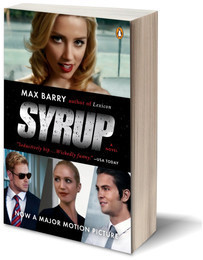
Also, Syrup just got itself a movie tie-in edition!
As a reader, I’ve always disdained movie tie-in editions. I’m all,
“If I wanted to see the movie, I would, like, see it.”
But as an
author, it makes me stupidly happy. I mean, movie tie-in edition.
Who wouldn’t want one of those. And I’ve never really loved the existing
Syrup covers. I don’t hate them. But I don’t love them.
The US paperback
in particular looks to me like an ironic comment on
marketing, only without the ironic part.
Plus, these will make excellent gifts for people who have no intention of
reading the book but will be impressed by the fact that it’s a movie.
July 9, 2013
The Future, with Librarians and Lipstick
FUTURE. I was there two years ago but in the meantime America advanced
about a decade. Now you use your phone to carry boarding passes and movie
tickets. When you need a ride somewhere, you summon cars with an app. I tried to buy a
sandwich in New York and the store didn’t take cash. DIDN’T TAKE CASH.
I met two people who don’t carry wallets any more, just credit cards. In two more
years, I guess, they will just carry phones.
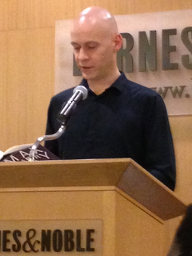
Now I’m home in Melbourne, Australia, I’m all, “Ugghhh, stores that only take
cash, how 2011.” I just bought some sushi and it seemed really stupid, handing
over a twenty and trusting the cashier to remember and figure out the right change.
That process is fraught with potential errors. If we didn’t already do it like that,
and somebody invented it, it would seem like a terrible idea.
Besides marveling at technological process, I was in the States to read and sign
books. During my New York event, a person asked, “What’s the worst thing
about being an author?” At first, I was overwhelmed by things to bitch about, like,
just that morning, I had really felt like some wheat-based cereal, but my fancy hotel
restaurant only did Granola. This is the kind of rough justice I’m expected to
put up with on book tour.
But beyond that, there was the whole thing about having a career that occasionally seems
like it’s about to dissolve into nothingness, which is sporadically terrifying,
and sometimes I write things nobody likes, which is disappointing, and working on
the same idea for years at a time can be challenging, too.
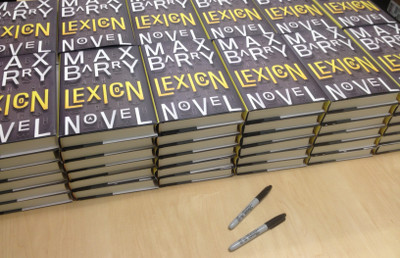
I didn’t catalog these pains, though, because they were hard to justify in the face of
a room full of people who had all come out to see me and buy my books so I
could keep writing stories for a living. That is just plain awesome. I think I’m getting more appreciative
in my old age, by which I mean less deluded about how rare and special this is,
getting to write books and have them published and people liking them. Thank you
so much to everyone who reads my stuff, and comes to see me, and tells other people
my books exist.
Speaking of which! I don’t know how you politely slip into conversation that you’ve
received a crapload of positive reviews, but CHECK THIS OUT:
a crapload of positive Lexicon reviews!
You have to admit, that’s a lot. Even I feel like buying a copy after reading that.
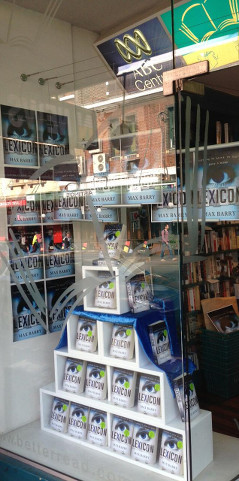
If you have bought a copy, and now you have questions, you might want to
join the
@Penguinusa Twitter Book Club
and tweet questions at
me. The first session is Tuesday 7pm EST (US).
Another thing I’m doing is fielding outrage from librarians.
At the end of Lexicon are
Acknowledgments, which contain this:
And, hey. You. Thanks for being the kind of person who likes to pick up a book. That’s a genuinely
great thing. I met a librarian recently who said she doesn’t read because books are her job, and when
she goes home, she just wants to switch off. I think we can agree that that’s as creepy as hell. Thank you
for seeking out stories, the kind that take place in your brain.
This sparked some amount of LIBRARIAN RAGE, expressed via email
and Twitter. In retrospect, I should have seen coming, because I am
married to a librarian and know how they work. See, librarians come
in two flavors: Kick-Ass Librarians and Mundane Librarians. Kick-Ass Librarians love books with
a deep and fiery passion, and have firm opinions about censorship, and
will cross burning coals and defeat ravenous lions in order to deliver
an age-appropriate book into the hands of a willing reader. Mundane Librarians—of
which there are very few, compared to Kick-Ass Librarians—just do the job.
To them, books are rectangular things that need to be scanned and filed.
When I say it like that, it doesn’t sound so bad. But to Kick-Ass Librarians, a Mundane
Librarian
is a new mother in a Birthing Ward who says, “Yeah, I just had a baby. He’s
around here somewhere.” It tears at the insides of Kick-Ass Librarians that
these people are entrusted with the care of books (and readers!). And it
burns them up to think that people believe all librarians are like that: Mundane.
So I am sorry for not being clearer about that, Kick-Ass Librarians.
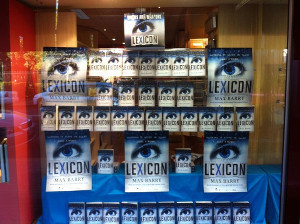
Finally! Are you Australian? Do you want to win a copy of Lexicon?
Do you sometimes lie awake, regretting things you did in high school? If
you answered YES to at least two of these questions, and they were the
first two, post a comment
here on maxbarry.com
plaintively begging
and/or arguing the merits of your case! The Australian publisher is kindly
letting me give away five copies. Entries close Friday 5pm!
Also! I just saw a minute ago that Syrup is opening in Canada this weekend in
Toronto and Calgary! That is literally all I know. I know this seems like
an incredibly stealthy way to release a movie, not telling anyone where
it’s playing, but that’s because you don’t understand marketing, and apparently neither do I.
OH WAIT I just sleuthed out some
info: Friday in Toronto at Carlton Cinemas. You can even
win
free tickets.
And that reminds me! Sorry, I have to mention this, too.
While I was in the US, I managed to collect two movie souvenirs.
One is a can of Fukk, which by rights belongs to Mat Coad, because he
won a competition to design a Fukk can
on this site six years ago. The other is the book “Lipstick Lesbians…
And Why Men LOVE Them! (A Girl’s Guide to Giving Straight Guys a Hard Time),”
which Scat discovers in 6’s apartment:

As it turns out, the designer of this prop, whose name I’m going to put
here as soon as I discover it, not only did an amazing job creating this
work of art, but also embedded jokes on the rear side:
Which I just think is awesome.
Also, apparently he used The Scarlett Pimpernel as a template.
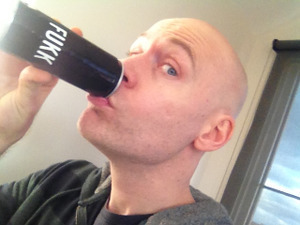

June 18, 2013
Watching "Syrup"
 My
Myfifth novel, Lexicon, is out today in the US & Canada,
so I’m going
to spend some of today visiting New York bookstores, looking at it,
and feeling weird. The
early press
on this book has been kind of shockingly good, like what you
dream about as an author but never actually happens, so I’m daring
to think that THIS COULD BE IT, the book that allows me to
use the word “bestselling” without abusing its definition. Poor
word. It has been so stretched.
Bookstore Events:
New York,
Los Angeles.
But a few days ago I finally watched Syrup and I need to tell you
what that was like! I’ve been building this up for about
five years and then I did one tweet, so people have been
asking HEY WHAT DID YOU THINK OF THE FILM. But I was traveling
and not sleeping and didn’t get the opportunity. Now I’m writing
this from a New York hotel room at 3:30am, so I’m making
my own opportunity, like Tony Robbins.
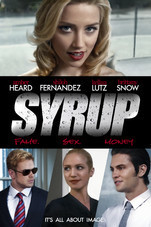 I
I
had been holding out to see Syrup in a theater, since that was
what I’d always dreamed about. But then I realized I had a problem,
because I could only see it in a theater in the US, and my wife, Jen,
wouldn’t be there. Jen was a huge part of writing Syrup; she read the first
draft one chapter at a time and got all excited about it in a highly
motivating and sexy way that made me keep writing. Plus she’s an
awesome person to see a movie with. But we
could only get a DVD in Australia, not see a theater showing.
So I made an executive decision: The night before I hopped a plane
(Melbourne to Sydney to Los Angeles to Houston to Columbus all in one
32-hour Friday),
Jen and I dragged the sofa up to the TV and closed the curtains,
so it would be like a real theater.
We were both nervous and held hands and said things like,
“Whatever it’s like, it doesn’t change the book.”
And! Then! We! Played! It!
I have trouble summarizing my reaction because I reacted
in pieces. I would see a scene and think, “Oh! I wrote this one!”
or “Wait that is different!” and I didn’t process it at all like
a normal person watching a movie. It was all about individual
scenes. But my first thoughts were:
“Oh no this is too confusing.” The first time I watched it,
I was a little shocked at how little setup there was, especially at the start,
and thought no-one would understand what was going on. Everything moved
so fast. But I’ve since seen it
again (in a theater in Columbus with an actual live audience, and ohhh,
how amazing to watch it like a proper movie), and I felt
this far less. I think my initial reaction was a novelist kind of thing;
films can move faster and the audience still picks up the gist
of what’s happening.
“This looks really good.” The visuals of the movie are really strong. I knew
the filmmakers were very big on this, and had an experienced and highly skilled cinematographer in
Julio Macat, but boy does that show. Every shot is beautiful and interesting.
“This scene I wrote is awesome!” My favorite parts, for completely selfish
reasons, were scenes that played out just like I’d written them in some
screenplay draft or other. And then they were on the screen! Some I loved
because they were just like I’d imagined (6 making Scat breakfast,
Scat shaking a dummy), and seeing them come to life was thrilling; some were
awesome because they took my material in unexpected directions,
elevating the scene beyond what I’d expected (the monologues,
ZephCo’s corporate goons—which Josh Pais and Christopher Evan
Welch play hilariously well).
I thought this must mean that I am an amazing screenwriter, but
later the director showed me some deleted scenes, which included lots
of stuff that played out just like I’d written and was really horrible,
so I realized the truth was they just kept my good parts. The rest,
which turned out to suck when filmed, were quietly executed. So
that’s lucky for me.
“Amber Heard is amazing.” Holy crap. Amber Heard is amazing. I was always
worried about how 6 would turn out, but Amber annihilated that character. In a good way. My
favorite part of the whole movie is her monologue about marketing love;
I think that’s perfect. I love Shiloh, too, and many many others, but Amber is
amazing. You should make a note so that when everyone else catches on
you can be all like, “I actually preferred her earlier work in Syrup.”
“How did they do all this?” I’ve thought this before, when I was on set, but I
keep re-thinking it. Novels are easy compared to films. Novels, I just sit
there and type and things happen. Films require people to painstakingly create every
detail that winds up on screen. It’s so practical. They have to wrestle
the real world into submission. They have to make decisions based on trade-offs and
logistics. And it’s so easy to forget because the end result looks effortless.
“OMG ending.” I’d heard they changed the ending. I’m not going to
say how, because, you know, spoilers. But I had written a particular
kind of ending in pretty much every screenplay draft, and then the film
went and did something completely different. And it’s better!
I saw my original ending as a deleted scene and boy did it suck. It sucked a lot.
The new one is actually thought-provoking and makes you want
to go back and rewrite some screenplays. That may just be me. But I love
the ending.
Overall, I think the film is very true to the book, not just in its
tone and characters but in how they are both kind of raw and and messy but
steam ahead powered by earnest, youthful enthusiasm, never worrying about
whether they’re being too ridiculous. The film is an indie and if that was
a thing for books, the book would be, too. They are a good match. As
an author, that’s what you want your film adaptation to be.
Well, also super successful. But most of all, you want it to be true.
This film is true.
How To Watch Syrup: So it turns out the movie is only playing in a super-limited
number of theaters and will mostly be an
iTunes/On
Demand/DVD kind of
thing. At which it’s doing well; it’s been sitting in the Top 100 Movie Rentals charts
for a month (currently #52), and wrestling with three or four others for the #1
Indie spot.
Thank you so much if you had something to do with making that happen.
It makes a massive difference to the people who sweated and toiled for
months or years on this, doing unspeakable things in the name of
making a good film.
Outside the US, I still don’t know; I keep hearing there will be some
kind of release in most major international markets, but all I know for sure
is Australia gets it in November.






